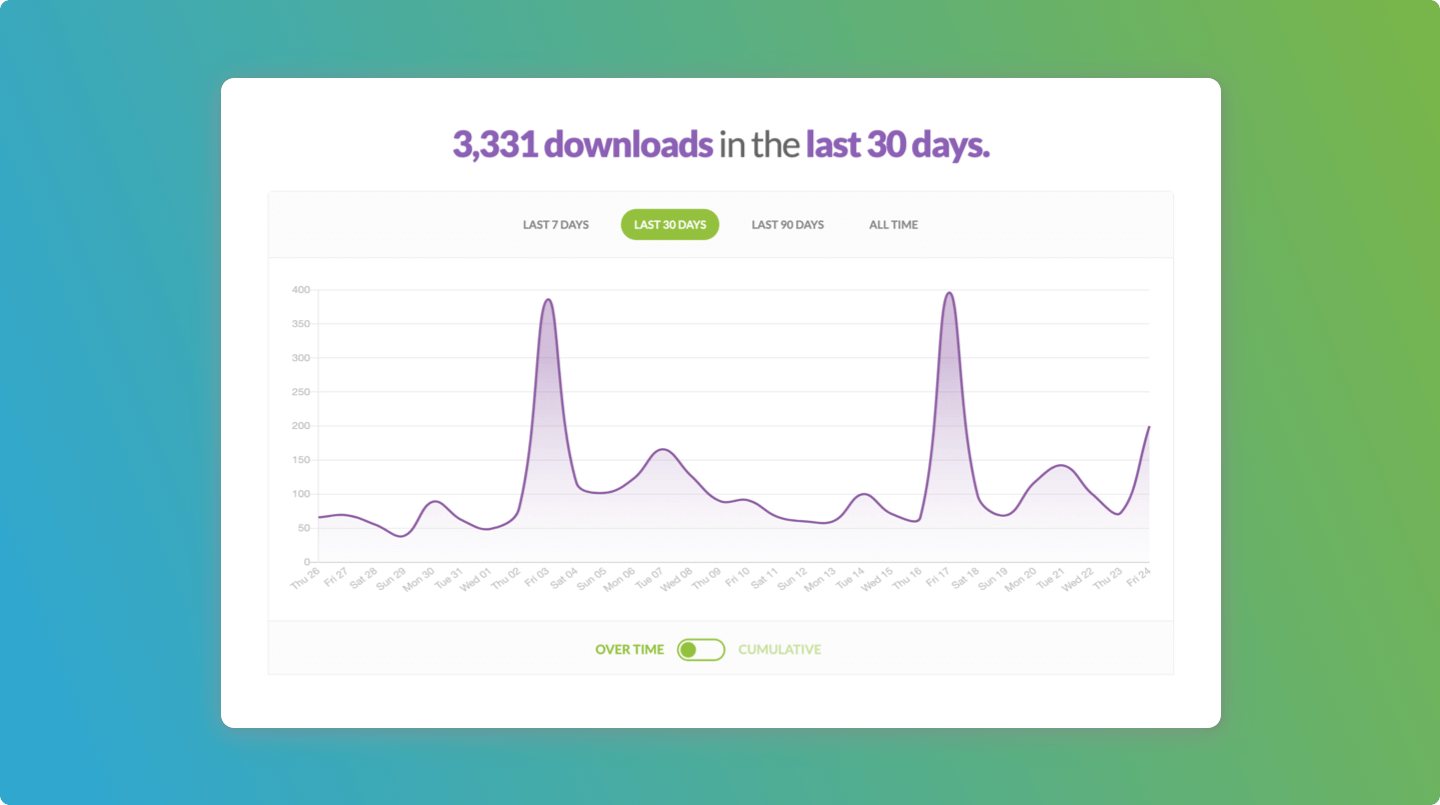Podcast Downloads vs Listens
In the evolving landscape of podcasting, understanding the impact of your content is critical to growth and success. Among the myriad metrics available, podcast downloads and unique listeners are crucial indicators. While both metrics offer valuable insights, they serve different purposes and tell stories about your podcast’s reach and engagement. This post dives deep into these metrics, elucidating their significance, challenges, and how they complement each other in the broader context of podcast analytics.
Unpacking Podcast Downloads
Podcast downloads represent the number of times an episode is downloaded from the internet. This metric is often seen as a straightforward indicator of a podcast’s popularity and potential reach. High download numbers suggest that a podcast is attracting attention, possibly due to compelling content or effective promotion.
However, the download metric is not without its limitations. It can be skewed by bots or inflated by the same listener downloading an episode across multiple devices. And yes, some people even buy podcast downloads. Don’t do this! If you need help getting your podcast heard, learn how to bring in new listeners with SEO.

Understanding Podcast Unique Listeners
On the other hand, podcast unique listeners measure the number of individuals who have listened to at least a portion of an episode. This metric offers a closer estimate of your actual audience size, engagement, and loyalty. By focusing on unique listeners, podcasters can gain insights into the core audience that consistently consumes their content.
Tracking and verifying unique listener data presents its own challenges, primarily due to privacy concerns and the technical complexities of distinguishing individual listeners. Nevertheless, this metric is indispensable for understanding listener behavior, preferences, and the effectiveness of content in retaining an audience.
The Interplay Between Downloads and Unique Listeners
While podcast downloads and unique listeners measure different aspects of audience interaction, they are not mutually exclusive. Downloads can indicate a podcast’s broad appeal and market penetration, while unique listeners provide depth into listener engagement and loyalty. Together, these metrics offer a comprehensive view of a podcast’s performance.
For example, a podcast might have high download numbers but fewer unique listeners, suggesting that many people are sampling but not staying. Conversely, a podcast with lower downloads but high unique listener retention could indicate a smaller yet highly engaged audience.
Strategy and Goal Alignment with Metrics
Prioritizing podcast downloads versus unique listeners should align with your podcast’s goals and strategies. Focusing on increasing downloads might be beneficial to maximize reach and attract sponsors. However, unique listeners and engagement metrics might be more relevant if you desire to build a loyal community or cater to a niche audience.
Podcasters should craft their content and marketing strategies based on the metrics that align with their goals. For instance, leveraging social media to boost awareness and downloads or engaging with your audience through interactive segments to increase loyalty and unique listener counts.
Beyond Downloads and Listeners: Other Metrics to Consider
While downloads and unique listeners are essential, they are just part of the analytics puzzle. Other metrics like episode completion rate and time spent listening provide further insights into how your content resonates with your audience. A holistic approach to podcast analytics, incorporating these and other data points, will enable a fuller understanding of your podcast’s performance and areas for improvement.
Defining Your Podcasting Goals and Monetization Alignment
When venturing into the world of podcasting, clearly defining your goals is essential. While download metrics provide valuable insights into audience reach and engagement, your objectives may extend beyond mere listenership numbers. Identifying your goals early on can help you strategize effectively and align your efforts with appropriate monetization strategies.
Establishing Your Podcasting Goals:
Audience Reach and Engagement: Attracting a wide audience and fostering engagement is often a primary goal for podcasters. Download metrics indicate your podcast’s visibility and appeal, allowing you to assess your reach and engagement levels.
Community Building: Engaging with your audience, fostering discussions, and creating a community can enhance listener loyalty and lead to long-term sustainability.
Content Quality and Impact: Striving for excellence in content production and storytelling can help you differentiate your podcast and attract dedicated listeners.
Personal Branding and Authority: Podcasting can also serve as a platform for personal branding and establishing authority in your niche. Consistently delivering valuable insights, expertise, or entertainment can position you as a trusted voice within your industry.
Aligning Goals with Monetization Strategies
Sponsorships and Advertising: If your goal is to maximize revenue through sponsorships and advertising, focusing on increasing download metrics can be instrumental. Higher download numbers attract potential sponsors and advertisers, allowing you to monetize through partnerships and promotional content.
Listener Support and Patronage: For podcasters seeking direct support from their audience, cultivating a dedicated community is key. Engaging with your listeners, offering exclusive content or perks, and promoting listener support platforms (e.g., Patreon) can incentivize fans to contribute financially to your podcast.
Product or Service Sales: If you have products or services related to your podcast niche, leveraging your podcast audience can be an effective sales channel. Incorporating product mentions, endorsements, or sponsored segments can drive sales and revenue directly from your podcast audience.
Premium Content and Subscriptions: Offering premium or exclusive content to your audience, such as bonus episodes, ad-free listening, or access to archives, can be monetized through subscription models. Providing value-added features for subscribers incentivizes listeners to become paying members, generating recurring revenue.
Affiliate Marketing: Partnering with relevant brands and promoting affiliate products or services can be a lucrative monetization strategy. Recommending products or services that are tried and true to your audience and earning commissions on resulting sales can supplement your podcast revenue.
Conclusion
Understanding the nuances between podcast downloads and unique listeners is crucial for podcasters aiming to measure and enhance their success. Each metric offers distinct insights into a podcast’s reach and engagement, and when used together, they provide a comprehensive picture of audience behavior. By aligning your podcasting goals with the appropriate metrics and adopting a holistic view of your analytics, you can tailor your content and strategies to grow your podcast effectively.
Navigating the metrics of podcast listens vs downloads is a journey of continuous learning and adaptation. By staying informed and responsive to what these numbers reveal, podcasters can forge deeper connections with their audience, achieve their goals, and celebrate the unique impact of their voice in the podcasting world.
- Best Podcast Cameras in 2026: Creator Picks for Every Budget
- Yamaha MGX Series for Podcasting: The Practical Guide (MGX12 vs MGX16 vs MGX-V)
- What Is Streamyard, This Weird Tool That Helps You Run a Professional Live Show
- What the “Async” Rebrand Actually Means for Your Old Podcast Files
- Why Serious Podcasters Are Moving to 10GbE NAS


